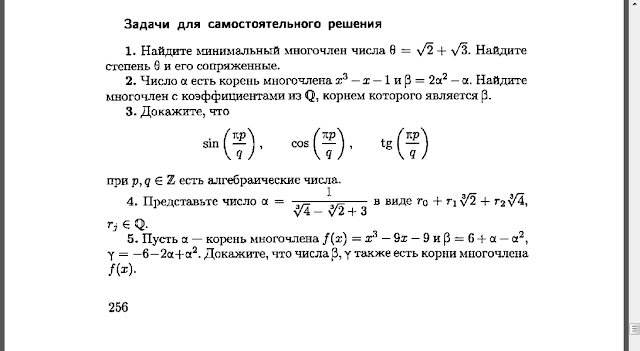I have solved such a problem before, here.
It's Problem #5 on page 256 of the book НЕСТРЕНКО Ю.[рий] В.[алентинович] ТЕОРИЯ ЧИСЕЛ
(Издательский центр "АКАДЕМИЯ", Москва, 2008)
In translation :" Let $\alpha$ be a root of the polynomial $f(x)=x^3-9x-9$ and $\beta=6+\alpha-\alpha ^2\;,\;\gamma=-6-2\alpha+\alpha ^2.$ Prove that the numbers $\beta\;,\;\gamma$, are also roots of the polynomial $f(x)$."
As we have seen before, the main difficulty of the problem lies in writing certain expressions as perfect squares.
Solution CiP
Obvious
$$\alpha ^3=9\alpha+9. \tag{1}$$
From here we get, first multiplying (1) by $\alpha$
$$\alpha ^4=9\alpha ^2+9\alpha\;, \tag{2}$$
then, from $\alpha \cdot (\alpha^2-9)=9$, that
$$\frac {1}{\alpha}=\frac{1}{9}\cdot \alpha ^2-1. \tag{3}$$
From the first formula of Vieta $\alpha +\beta +\gamma=0$ we get
$$\beta+\gamma=-\alpha, \tag{4}$$
and from the third $\alpha \cdot \beta \cdot \gamma=9$ we deduce $\beta \cdot \gamma=\frac{9}{\alpha}$ therefore (see relation (3))
$$\beta \cdot \gamma=\alpha^2-9. \tag {5}$$
Or we can, from $\beta \cdot \gamma=\frac{9}{\alpha}$, calculate the same way
$(\beta-\gamma)^2=(\beta+\gamma)^2-4\cdot \beta \gamma=(-\alpha)^2-4 \cdot \frac{9}{\alpha}=\frac{\alpha^3-36}{\alpha}\underset{(1)}{=} \frac{9\alpha+9-36}{\alpha}=$
$$=9 \cdot \frac{\alpha -3}{\alpha}=9\cdot \frac{\alpha^2-3\alpha}{\alpha^2}. \tag{7}$$
It would be preferable to have perfect squares in relations (6) and/or (7). The method of undetermined coefficients did not help me this time. I don't know by what miracle I finally determined (which can be verified immediately by calculation) the following:
$36-3\alpha^2=(2\alpha^2-3\alpha-12)^2, $ and
$\alpha^2-3\alpha=(\alpha^2-2\alpha-6)^2.$
Now, from (6) it follows $\beta-\gamma=12+3\alpha-2\alpha^2$ (making one of the possible choices of $\pm$ signs) which combined with (4) leads to the desired values
$$\beta=6+\alpha -\alpha^2\;, \;\gamma=-6-2\alpha+\alpha^2.$$
$\blacksquare$

Niciun comentariu:
Trimiteți un comentariu